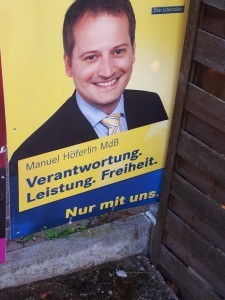German politics never fails to amaze: After the Left parties successful attempt to condemn itself to irrelevance without actually splitting the party, the ball is back in the ruling coalition’s court. Today was the day of the ‘coalition summit’, i.e. a formal meeting of the respective leaders of the three parties in the chancellery. The main purpose of these summits is not normally to have a frank exchange of ideas, or to draw up grand designs – it’s a bit late for that in the electoral cycle anyway. Rather, they are shows of unity and determination. As such, they would normally end with a joint press conference or some other public display of sympathy and dynamism. Today, the three leaders left the chancellery in their limousines, denying us any comments, which of course looks like a statement in its own right.
Apparently, however, they have agreed on two things: After months of quarrelling, the coalition will initiate legislation on the ‘Betreuungsgeld’, a pet project of the Bavarian CSU. Over the last years, the government has invested heavily (by West German standards) in the development of state-run and state-sponsored day nurseries, and will have to invest a lot more to meet its targets. This is not exactly a Christian-conservative priority, and so the CSU wants an extra subsidy for parents who do not use these subsidised facilities. Large parts of the CDU are lukewarm at best, and the FDP says it’s nonsensical, but they will go ahead with it nonetheless because they accepted the idea in principle in the 2009 coalition talks. As a reward for them, the government will also initiate legislation on an FDP project: a subsidy/tax credit for private long-term care insurance contracts that complement the state-run long-term care insurance program. Experts disagree how much extra money will be needed for care, and it seems a little roundabout and not very liberal to tax people so that the government can then hand that money back in the form of subsidies to private companies that provide a service which the state cannot provide, but I trust that some people in the industry are very happy tonight. And yes, this is the very same government that insists on austerity and balanced budgets.
Back in 1951, Lasswell and Lerner defined policy as ‘a systematic attempt to shape the future’. But that was before the discipline invented symbolic politics, and I’m sure the coalition summit is exactly what they had in mind.

